#african language
Text
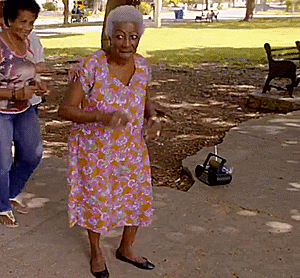
#Cuba#Nigerian#african#afrakan#kemetic dreams#africans#brownskin#brown skin#afrakans#african culture#afrakan spirituality#african landscape#African language#Cuban language#spainish#lucumi#Yoruba#epic video
160 notes
·
View notes
Text
Hi! I’m a Finn living in Ghana and married to a Dangme. I live in an area where there are a lot of Fante speakers but at home we speak Dangme and Finnish. I lied. My family speaks mostly English. But we are trying to speak more Dangme and Finnish. Anyway…
Dangme:
Dangme is my main target 🎯 language. I really really want to be able to speak with my in-laws.
Fante:
I rather reluctantly and passively learn Fante. Everybody speaks it at my workplace so I should learn it. But I don’t wanna. Don’t ask me why. I don’t know the answer. 🤷🏼♀️ Anyway a Fante teacher comes to our house every Sunday mainly to give my kids private lessons so they can catch up with their Fante peers. Fante is compulsory subject in their school. I’m so far behind my kids already.
Twi:
Everybody keeps telling me to learn Twi instead because it’s somewhat of a lingua Franca here. I did at some point but it distracted my Dangme learning and also confused me because it’s so similar to Fante. I may return to learning Twi at some point. But I want to master Dangme first. This might be a dumb thing to do but…
GSL/ASL
I am very interested in Ghanaian Sign Language and American Sign Language too. So sometimes I play around with those two. But like I don’t have any pressure to learn them. I just want to be able to communicate with a lady who sells me fruits and honestly she is so sweet I wish to be her friend so hopefully 🤞 I can learn a few phrases at least to get started.
French
Ok so I was really burnt out and frustrated in Dangme for some time and kinda gave up a bit. So as there was a language vacuum in my life obviously I had to learn SOMETHING. I watched SKAM France and fell in love. It was Covid lock down and I had lots of time so I was learning that a bit. It was so easy compared to Dangme. Anyway I only did like very basics and then sifted my focus back to Dangme. But I do still follow some French media and books when I get a chance. Also my kids have to take French in school so I sometimes learn with them.
Swedish
Yeah. I was supposed to learn Swedish in school. I mean, I think I can still read some simple texts but … I watched Young Royals and understood NOTHING. Ok maybe simple stuff like Jag älskar dig and stuff like that. If I had time I would revise Swedish. But alas, time is that one thing I lack these days.
English
Learnt it in school. I use it every day. Still not fluent though. I guess all I can do at this point is to read more challenging texts. I don’t really have a plan. I’m quite comfortable with my current level. I’m not a perfectionist.
Finnish
Having lived 10 years abroad I sometimes feel my own language is a bit rusty. Still someone contacted me that I should start offering Finnish courses here in Ghana. I mean… I don’t think I’m qualified but if there are people who need a tutor I guess I can help. But Finnish grammar is a real bitch.
I think that’s all for now. I try not to get involved with any more languages. Though my husband was suggesting we move to UAE for a while. Arabic? 😅
Anyway, that’s me. I would really like friends. Especially if you also struggle with learning rare languages. Or want help with Finnish.
#african languages#dangme#language learning#gadangme#african language#French#English#asl#gsl#sign language#Finnish#ghana
11 notes
·
View notes
Text
Duolingo Sucks, Now What?: A Guide
Now that the quality of Duolingo has fallen (even more) due to AI and people are more willing to make the jump here are just some alternative apps and what languages they have:
"I just want an identical experience to DL"
Busuu (Languages: Spanish, Japanese, French, English, German, Dutch, Italian, Portuguese, Chinese, Polish, Turkish, Russian, Arabic, Korean)
"I want a good audio-based app"
Language Transfer (Languages: French, Swahili, Italian, Greek, German, Turkish, Arabic, Spanish, English for Spanish Speakers)
"I want a good audio-based app and money's no object"
Pimsleur (Literally so many languages)
Glossika (Also a lot of languages, but minority languages are free)
*anecdote: I borrowed my brother's Japanese Pimsleur CD as a kid and I still remember how to say the weather is nice over a decade later. You can find the CDs at libraries and "other" places I'm sure.
"I have a pretty neat library card"
Mango (Languages: So many and the endangered/Indigenous courses are free even if you don't have a library that has a partnership with Mango)
Transparent Language: (Languages: THE MOST! Also the one that has the widest variety of African languages! Perhaps the most diverse in ESL and learning a foreign language not in English)
"I want SRS flashcards and have an android"
AnkiDroid: (Theoretically all languages, pre-made decks can be found easily)
"I want SRS flashcards and I have an iphone"
AnkiApp: It's almost as good as AnkiDroid and free compared to the official Anki app for iphone
"I don't mind ads and just want to learn Korean"
lingory
"I want an app made for Mandarin that's BETTER than DL and has multiple languages to learn Mandarin in"
ChineseSkill (You can use their older version of the course for free)
"I don't like any of these apps you mentioned already, give me one more"
Bunpo: (Languages: Japanese, Spanish, French, German, Korean, and Mandarin)
#EDIT: Added a great resource for ESL and African languages that weren't found elsewhere#I do NOT recommend memrise and will talk about it another day but#langblr#duolingo#duo#language learning#language learning apps#mandarinblr#resource#reference
68K notes
·
View notes
Text
The Great Dinka Tribe of South Sudan: Culture, History, and People
The Resilient Dinka Tribe of South Sudan
The Dinka represent the largest ethnic group and tribe in South Sudan, concentrated along the banks of the White Nile River basin numbering around 4.5 million people. As cattle herders whose way of life revolves around their cows, the Dinka have preserved a resilient culture centered on their ancestral Nilotic language passed through generations. However,…

View On WordPress
#African language#cattle herding#Dinka people#Dinka tribe#displacement#indigenous religion#migration#Nilotic culture#South Sudan#traditional lifestyle
0 notes
Text
Nta means twin.
Nta in the Akan language means twin. Two or more, and from here comes the English word inter.
Interview. Inter-nation(al). Intertwine etc.
0 notes
Text
Naming International POC Characters: Do Your Research.
This post is part of a double feature for the same ask. First check out Mod Colette's answer to OP's original question at: A Careful Balance: Portraying a Black Character's Relationship with their Hair. Below are notes on character naming from Mod Rina.
~ ~ ~
@writingraccoon said:
My character is black in a dungeons and dragons-like fantasy world. His name is Kazuki Haile (pronounced hay-lee), and his mother is this world's equivalent of Japanese, which is where his first name is from, while his father is this world's equivalent of Ethiopian, which is where his last name is from. He looks much more like his father, and has hair type 4a. [...]
Hold on a sec.
Haile (pronounced hay-lee), [...] [H]is father is this world’s equivalent of Ethiopian, which is where his last name is from.
OP, where did you get this name? Behindthename.com, perhaps?

Note how it says, “Submitted names are contributed by users of this website. Check marks indicate the level to which a name has been verified.” Do you see any check marks, OP?
What language is this, by the way? If we only count official languages, Ethiopia has 5: Afar, Amharic, Oromo, Somali, & Tigrinya. If we count everything native to that region? Over 90 languages. And I haven't even mentioned the dormant/extinct ones. Do you know which language this name comes from? Have you determined Kazuki’s father’s ethnic group, religion, and language(s)? Do you know just how ethnically diverse Ethiopia is?
~ ~ ~
To All Looking for Character Names on the Internet:
Skip the name aggregators and baby name lists. They often do not cite their sources, even if they’re pulling from credible ones, and often copy each other.
If you still wish to use a name website, find a second source that isn’t a name website.
Find at least one real life individual, living or dead, who has this given name or surname. Try Wikipedia’s lists of notable individuals under "List of [ethnicity] people." You can even try searching Facebook! Pay attention to when these people were born for chronological accuracy/believability.
Make sure you know the language the name comes from, and the ethnicity/culture/religion it’s associated with.
Make sure you understand the naming practices of that culture—how many names, where they come from, name order, and other conventions.
Make sure you have the correct pronunciation of the name. Don’t always trust Wikipedia or American pronunciation guides on Youtube. Try to find a native speaker or language lesson source, or review the phonology & orthography and parse out the string one phoneme at a time.
Suggestions for web sources:
Wikipedia! Look for: “List of [language] [masculine/feminine] given names,” “List of most common [language] family names,” “List of most common surnames in [continent],” and "List of [ethnicity] people."
Census data! Harder to find due to language barriers & what governments make public, but these can really nail period accuracy. This may sound obvious, but look at the year of the character's birth, not the year your story takes place.
Forums and Reddit. No really. Multicultural couples and expats will often ask around for what to name their children. There’s also r/namenerds, where so many folks have shared names in their language that they now have “International Name Threads.” These are all great first-hand sources for name connotations—what’s trendy vs. old-fashioned, preppy vs. nerdy, or classic vs. overused vs. obscure.
~ ~ ~
Luckily for OP, I got very curious and did some research. More on Ethiopian & Eritrean naming, plus mixed/intercultural naming and my recommendations for this character, under the cut. It's really interesting, I promise!
Ethiopian and Eritrean Naming Practices
Haile (IPA: /həjlə/ roughly “hy-luh.” Both a & e are /ə/, a central “uh” sound) is a phrase meaning “power of” in Ge’ez, sometimes known as Classical Ethiopic, which is an extinct/dormant Semitic language that is now used as a liturgical language in Ethiopian churches (think of how Latin & Sanskrit are used today). So it's a religious name, and was likely popularized by the regnal name of the last emperor of Ethiopia, Haile Selassie (“Power of the Trinity”). Ironically, for these reasons it is about as nationalistically “Ethiopian” as a name can get.
Haile is one of the most common “surnames” ever in Ethiopia and Eritrea. Why was that in quotes? Because Ethiopians and Eritreans don’t have surnames. Historically, when they needed to distinguish themselves from others with the same given name, they affixed their father’s given name, and then sometimes their grandfather’s. In modern Ethiopia and Eritrea, their given name is followed by a parent’s (usually father’s) name. First-generation diaspora abroad may solidify this name into a legal “surname” which is then consistently passed down to subsequent generations.
Intercultural Marriages and Naming
This means that Kazuki’s parents will have to figure out if there will be a “surname” going forward, and who it applies to. Your easiest and most likely option is that Kazuki’s dad would have chosen to make his second name (Kazuki’s grandpa’s name) the legal “surname.” The mom would have taken this name upon marriage, and Kazuki would inherit it also. Either moving abroad or the circumstances of the intercultural marriage would have motivated this. Thus “Haile” would be grandpa’s name, and Kazuki wouldn’t be taking his “surname” from his dad. This prevents the mom & Kazuki from having different “surnames.” But you will have to understand and explain where the names came from and the decisions dad made to get there. Otherwise, this will ring culturally hollow and indicate a lack of research.
Typically intercultural parents try to
come up with a first name that is pronounceable in both languages,
go with a name that is the dominant language of where they live, or
compromise and pick one parent’s language, depending on the circumstances.
Option 1 and possibly 3 requires figuring out which language is the father’s first language. Unfortunately, because of the aforementioned national ubiquity of Haile, you will have to start from scratch here and figure out his ethnic group, religion (most are Ethiopian Orthodox and some Sunni Muslim), and language(s).
But then again, writing these characters knowledgeably and respectfully also requires figuring out that information anyway.
~ ~ ~
Names and naming practices are so, so diverse. Do research into the culture and language before picking a name, and never go with only one source.
~ Mod Rina
#asks#language#languages#linguistics#east africa#african#immigration#ethiopian#names#naming#research#resources#writeblr#character names#character name ideas#rina says read under the cut. read it
4K notes
·
View notes
Text

Dancing on the beach in The Gambia
720 notes
·
View notes
Text
Stop correcting southerners . It’s very anti black . A Lot of AAVE or Ebonics come from the south . Respect it . There is no proper way to speak
#AAVE#Ebonics#black power#knowledge#black knowledge#language#English#african american#african american history
1K notes
·
View notes
Text
In Tunisian, we don't say 'I miss you', we say 'twahashtek/ توحشتك' which translates to I became lonely (without) you, and I think that's beautiful.
#tunisian#north african languages#توحشتك#words#ya hassra ki kont n3allam fikom fetounsi lenna eh#text#love#cute texts#I miss you#الحب بالتونسي
2K notes
·
View notes
Text
Are there Black dialects of Spanish?

Some people got a surprising result after taking an MIT dialect quiz. It was meant to guess what U.S. dialect the test taker spoke and the person's native language. As results started coming in, many Spanish speakers saw their English dialect had been marked as “U.S. Black Vernacular/Ebonics”
But what's the connection between speaking Spanish and U.S. Black Vernacular?
In the United States, dialects spoken by African Americans are sometimes referred to as Black English, African American Vernacular English, or even Ebonics. Though the terms have had different levels of popularity, having a specific name at all has given African Americans the ability to reclaim their language practices as a joyous part of their identity.
But much less common are terms and discussions about Blackness and Black language beyond English. If Black English dialects exist, are there also Black forms of other languages due to colonization? For example, are there Black Spanishes and Black Portugueses, too? Read more here.
Source: Are there Black dialects of Spanish? by Aris M. Clemons
Visit www.attawellsummer.com/forthosebefore to learn more about Black history.
Need a freelance graphic designer or illustrator? Send me an email.
#black history#Afro-Latino#diaspora#African diaspora#dialects#linguistics#race#identity#language#Spanish#AAVE#ebonics#African American Vernacular English
105 notes
·
View notes
Text
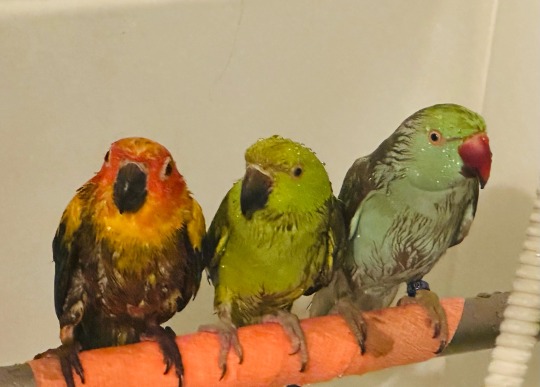
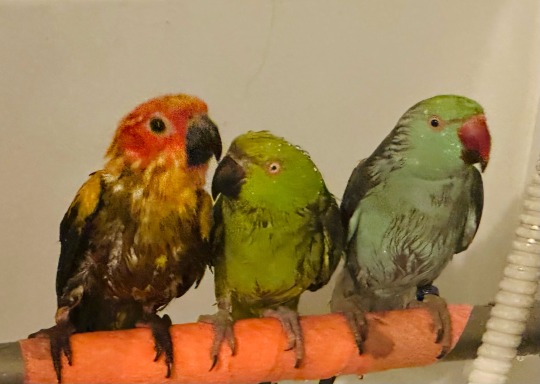

“BACK OFF!“
#this is actually a really interesting set of photos if you are interested at all in bird body language#sun conure#African ringneck#Indian Ringneck#birbposting#post shower chillin
119 notes
·
View notes
Text
Hausa (/ˈhaʊsə/; Harshen/Halshen Hausa; Ajami: هَرْشَن هَوْسَ) is a Chadic language spoken by the Hausa people in the northern half of Nigeria, Ghana, Cameroon, Benin and Togo, and the southern half of Niger, Chad and Sudan, with significant minorities in Ivory Coast.
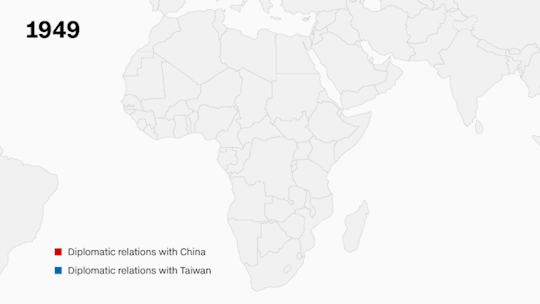
Quick Facts Native to, Region ...
Hausa is a member of the Afroasiatic language family and is the most widely spoken language within the Chadic branch of that family. Ethnologue estimated that it was spoken as a first language by some 47 million people and as a second language by another 25 million, bringing the total number of Hausa speakers to an estimated 72 million.
#african#afrakan#kemetic dreams#afrakans#africans#hausa#hausa language#african language#west african#african culture
15 notes
·
View notes
Text

Blibliibli - Attractively dark 😍👩🏿🦱
#dangme#african languages#language learning#gadangme#language notes#african language#rare languages#Dangme language
2 notes
·
View notes
Text
South African Sign Language (SASL) became South Africa's 12th official language today
173 notes
·
View notes
Photo
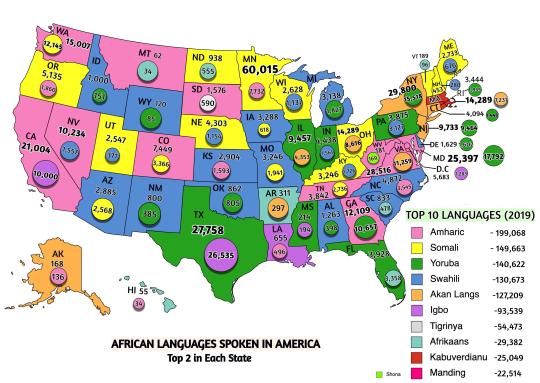
Top 2 African languages spoken in each US state
231 notes
·
View notes
Text
There are 2,900 languages that are endangered. This means they have fewer than 10,000 speakers, and most of them are not being passed on to younger generations.
What Causes Language Extinction?
1. Colonization and oppression
2. Globalization and urbanization
3. Education and media
4. Attitudes and prestige
Why Does Language Extinction Matter?
1. Cultural heritage
2. Scientific knowledge
3. Linguistic diversity
How Can We Save Endangered Languages?
1. Documentation and revitalization
2. Policy and legislation
3. Awareness and advocacy
Places ranked by Endangered Languages
1. Africa with 619 languages
2. Asia with 613 languages
3. South America with 448 languages
4. North America with 182 languages
5. Pacific with 592 languages
6. Europe with 238 languages
7. Australia with 108 languages
#language#cultural heritage#endangered languages#historic preservation#anthropology#linguistics#asian#south america#african#language learning#native language
128 notes
·
View notes